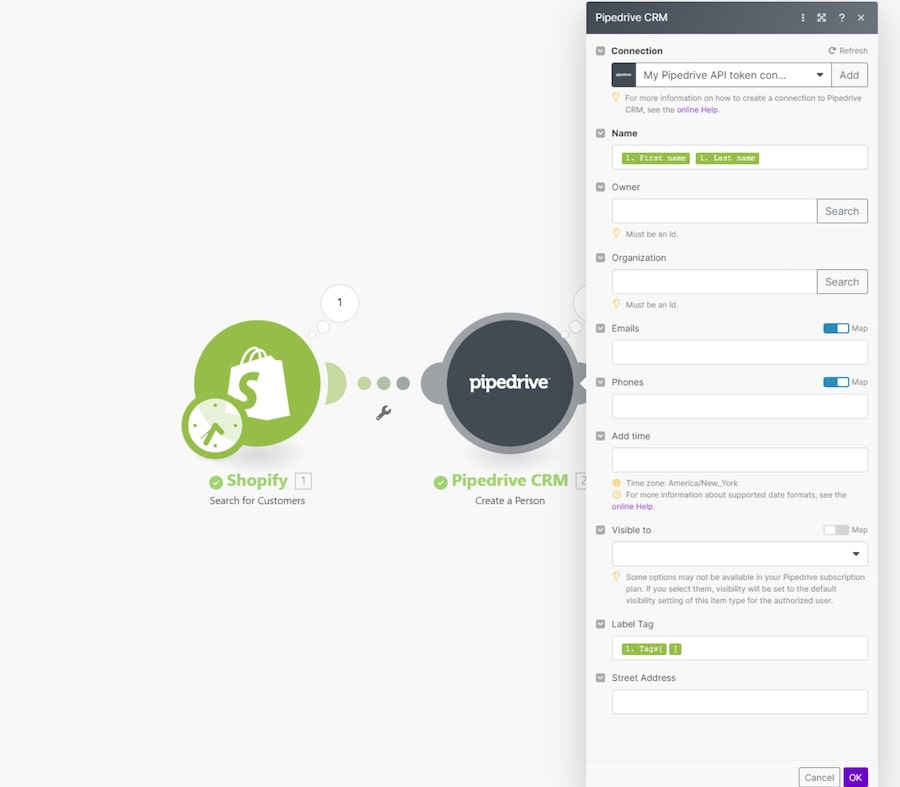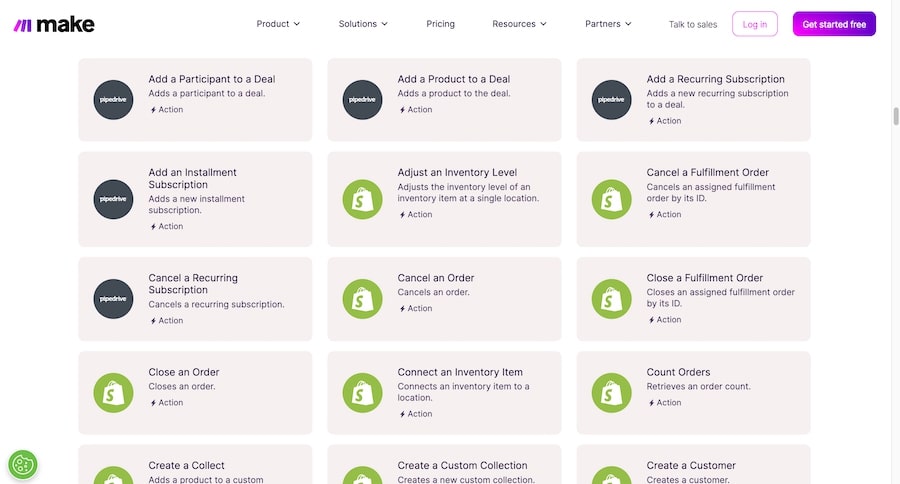Business owners who run an ecommerce store can create a seamless customer experience by integrating customer relationship management (CRM) software with Shopify. The best Shopify CRM system helps you understand purchasing behaviors better and market more effectively.
Communicate with customers from your CRM via email, social media, and phone to stay top of mind. We want to help you optimize your Shopify store. So we identified the best Shopify CRM integrations based on cost, features, and product usability.
- HubSpot CRM: Best overall for free Shopify integration
- Zoho CRM: Best for managing multiple Shopify stores
- Zendesk Sell: Best for order management
- Bitrix24: Best for product list management
- Pipedrive: Best for sales and inventory tracking
- Freshmarketer: Best for multichannel customer engagement
- Capsule CRM: Best for customer segmentation
Best Shopify CRM Software Compared
Provider | Free Plan | Starting Monthly | Our CRM Rating out of 5 |
|---|---|---|---|
✓ 5 users | $15 per user | 4.57 | |
 | ✓ 3 users | $14 per user (15-day free trial) | 4.56 |
✕ | $19 per user 14-day free trial | 4.51 | |
 | ✓ Unlimited users | $49 for 5 users | 4.46 |
 | ✕ | $14 per user (14-day free trial) | 4.44 |
✓ 100 marketing contacts | $15 for 500 marketing contacts (21-day free trial) | 4.24 | |
 | ✓ 2 users | $18 per user (14-day free trial) | 4.18 |
HubSpot CRM: Best Overall for Free Shopify Integration

Pros
- Feature-rich free plan includes Shopify integration with two-way data sync.
- You can create an ecommerce dashboard to track Shopify orders and customer engagement.
- Ecommerce tools include invoices, payment processing, quotes, product library, and revenue reporting.
Cons
- It lacks ecommerce automation and inventory management features.
- It has a steep price jump from Starter ($15/user/month) to Professional tier ($90/user/month).
- Email campaign performance insights are locked in with a Professional plan ($90/user/month).
- You need a free Shopify CRM for your ecommerce business: HubSpot CRM made it to the top of this list because of its robust free plan that offers integration with third-party apps, including Shopify. This connection allows two-way sync for contact and product data between the two apps in real time. You can also track Shopify orders using HubSpot CRM’s ecommerce pipeline and view abandoned carts from your CRM.
- You want to build ecommerce reports to track Shopify customer engagement: Once you connect HubSpot CRM to Shopify, ecommerce reports are automatically added to your account. You can generate reports using the CRM’s ecommerce premade templates for easier tracking of your Shopify customers’ orders and engagement with your store.
- You’re looking for an ecommerce CRM for payment processing: This provider is included in our list of the best ecommerce CRMs because of its built-in payment processing tools. The free plan allows you to accept Stripe payments, while paid plans (starting at $15 per user monthly) include the ability to process digital and automated clearing house (ACH) payments.
- You need a CRM system with ecommerce campaign automation tools: Unfortunately, you’ll need to subscribe to the HubSpot Marketing Hub Professional plan ($800 per month for three users) to automate ecommerce campaigns. This can be a steep price for small teams and businesses with limited resources.
- Alternative: Freshmarketer has a free option that lets you launch Shopify campaigns for welcome emails, price drop notifications, and abandoned carts. It also allows you to engage with customers on multiple channels, including live chat, short message service (SMS), email, and social media.
- You want access to inventory management features: HubSpot CRM does not have built-in tools for inventory management. You can work around this feature gap by integrating the platform with a third-party app from the HubSpot App Marketplace, such as Megaventory.
- Alternatives: All of Pipedrive’s plans (starting at $14 per user monthly) allow you to manage Shopify inventory from your CRM. Other providers that have built-in inventory management features are Bitrix24’s freemium option and Zoho CRM’s Standard plan ($14 per user monthly).
HubSpot CRM Pricing Plan & Overview*
*Pricing is based on annual billing per month of the Sales Hub plans for individuals and small teams. Monthly billing and enterprise-level plans are available at a higher cost. We update pricing information regularly but encourage our readers to check current pricing.
**Customer Platform includes sales, marketing, customer service, content management system (CMS), and operations software. Purchase individual modules for lower monthly costs.
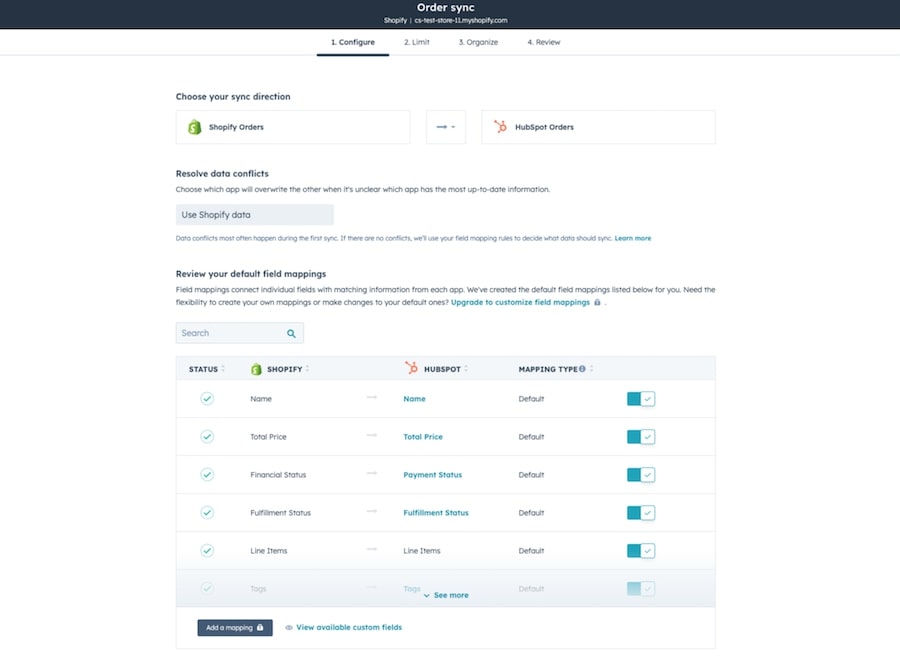
HubSpot CRM-Shopify data sync setting and rules (Source: HubSpot App Marketplace)
Our Expert Opinion
HubSpot CRM clinched the top spot in our list of the best CRM for Shopify because it offers a robust set of ecommerce tools even with its free plan. It offers two-way data sync with Shopify and the ability to track customer engagement from its ecommerce dashboard. Other notable ecommerce features include tools for invoicing, payment processing, quote generation, product management, and revenue reporting.
Zoho CRM: Best for Managing Multiple Shopify Stores

Pros
- Shopify to Zoho CRM extension allows users to sync data from multiple Shopify stores to Zoho CRM.
- It offers cost-scalable tools for managing inventory, price books, quotes, sales orders, purchase orders, and vendors.
- Zoho marketplace offers multiple free and paid apps for Shopify CRM integrations.
Cons
- Free plan does not include Shopify integration (requires paid subscription starting at $14 per user monthly).
- Shopify to Zoho CRM extension requires additional cost ($20 per organization monthly).
- It has a steep learning curve due to robust features and a clunky interface.
- You run more than one Shopify store: You can connect this platform with the Shopify to Zoho CRM extension, which allows you to sync customer, order, and product data from multiple Shopify stores to the CRM. You can view details on customer orders, product variants, shipping, and payment status directly from Zoho CRM, enabling your team to respond faster to customer queries.
- You’re looking for a low-cost ecommerce CRM: You can access Zoho CRM’s ecommerce features when you subscribe to its Standard at just $14 per user monthly. It has an inventory management module with customizable templates for quotes, purchase orders, sales orders, and invoices. The Professional plan ($23 per user monthly) includes a CPQ system for automating product lines and price rules.
- You need a free CRM with Shopify integration: Zoho CRM has a free option for three users with robust sales force automation features. However, its ecommerce features and Shopify integration options are locked in with its paid plans (starting at $14 per user monthly).
- Alternatives: HubSpot CRM is our overall best CRM for Shopify because of its robust feature inclusions across all plans. Its free plan provides you with a two-way data sync with Shopify so that you can track contact, order, and product data from the CRM. Capsule CRM also has a freemium option for two users that enables you to sync and segment your Shopify customers.
- You want a simple CRM for Shopify: Zoho CRM is not known for its usability as its robust and advanced features create a steep learning curve, especially for users with no technical background. Customizing the platform according to your business needs also usually requires technical assistance.
- Alternative: Pipedrive is well-known for its simplicity and ease of use. Its highly intuitive interface, drag-and-drop functionality, and comprehensive knowledge base all make it very easy to use regardless of your technical skill and experience.
Zoho CRM Pricing Plan & Overview*
*Pricing is based on annual billing per month. Monthly billing is available at a higher cost. Zoho CRM comes with a 15-day free trial for paid plans. We update pricing information regularly but encourage our readers to check current pricing.
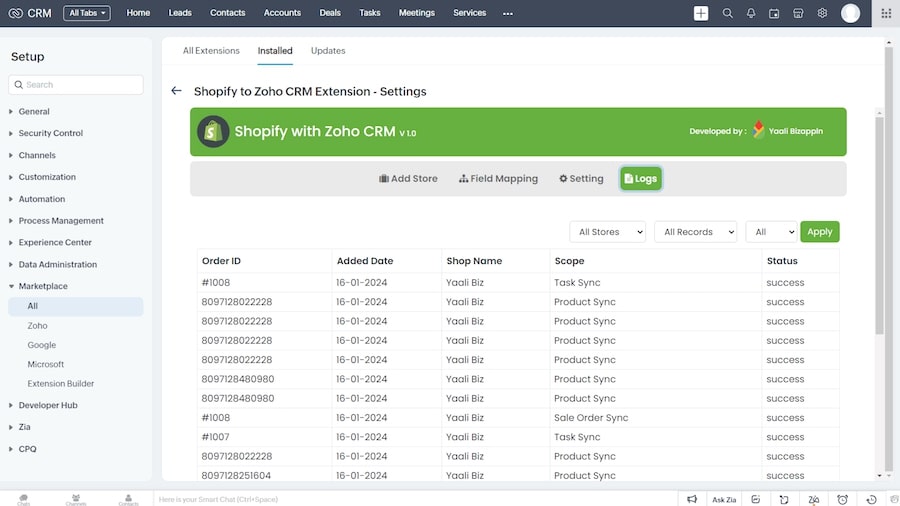
The Shopify to Zoho CRM extension shows orders from multiple Shopify stores. (Source: Zoho Marketplace)
Our Expert Opinion
Zoho CRM makes it easier for business owners to manage multiple Shopify stores from a single interface through its Shopify to Zoho CRM extension. It provides seamless synchronization of customer, order, and product data from several Shopify stores. It also automatically creates customer profiles, orders, and product records in Zoho CRM for each order in Shopify. Plus, its multicurrency support enables you to manage transactions in different currencies.
Zendesk Sell: Best CRM for Shopify Order Management
Pros
- Robust Shopify order management tools can be accessed via Shopify by Zenplates on the Zendesk Marketplace.
- Communicate with customers through email, phone, and text from the CRM.
- It has robust customer service analytics and reporting tools.
Cons
- It has no free plan; Shopify by Zenplates costs an additional $4.95 per user monthly.
- Advanced reporting tools like sales forecasting, activity reports, and goal tracking are locked in with Sell Growth ($55 per user monthly).
- Task automation tools are expensive ($115 per user monthly with Sell Professional).
- You want a CRM with robust Shopify order management capabilities: You can install the Shopify by Zenplates app on Zendesk Sell to manage Shopify orders directly from your CRM. You can access Shopify customer and order data, link orders to tickets, restock items within an order, as well as process payments, reorders, refunds, and cancellations.
- You want to deliver omnichannel service to your Shopify customers: Zendesk Sell lets you communicate with customers via email, phone calls, and text messaging from its Communication Center. It is also equipped with an automated power dialer that allows you to build a call list that automatically cycles through your leads and prospects, helping you save time and effort.
- You need free or low-cost Shopify integration options: Since Zendesk Sell’s plans start at $19 per user monthly, it goes to say that you cannot connect it with Shopify for free. In addition, you can only integrate it with Shopify via third-party app connectors like Zapier or its native Shopify by Zenplates app, which costs $4.95 per user monthly.
- Alternative: HubSpot CRM and Capsule CRM both offer a free plan that lets you sync Shopify data in real time. Freshmarketer is another free option for users who want to launch Shopify campaigns from their CRM.
- You’re looking for a CRM with more affordable reporting tools: Zendesk Sell offers prebuilt sales dashboards for tracking sales metrics with its Sell Team plan ($19 per user monthly). However, advanced reporting tools like custom dashboards, sales forecasting, and activity reports are locked behind the Sell Growth plan ($55 per user monthly).
- Alternatives: Zoho CRM and Bitrix24 both offer sales reporting tools with their respective free plans. Pipedrive’s Standard plan ($14 per user monthly) also offers a visual sales dashboard for tracking deal and activity metrics.
Zendesk Sell Pricing Plan & Overview*
*Pricing is based on annual billing per month for plans for small teams and business. An enterprise-level plan and monthly billing are available at a higher cost. Zendesk Sell comes with a 14-day free trial for paid plans. We update pricing information regularly but encourage our readers to check current pricing.
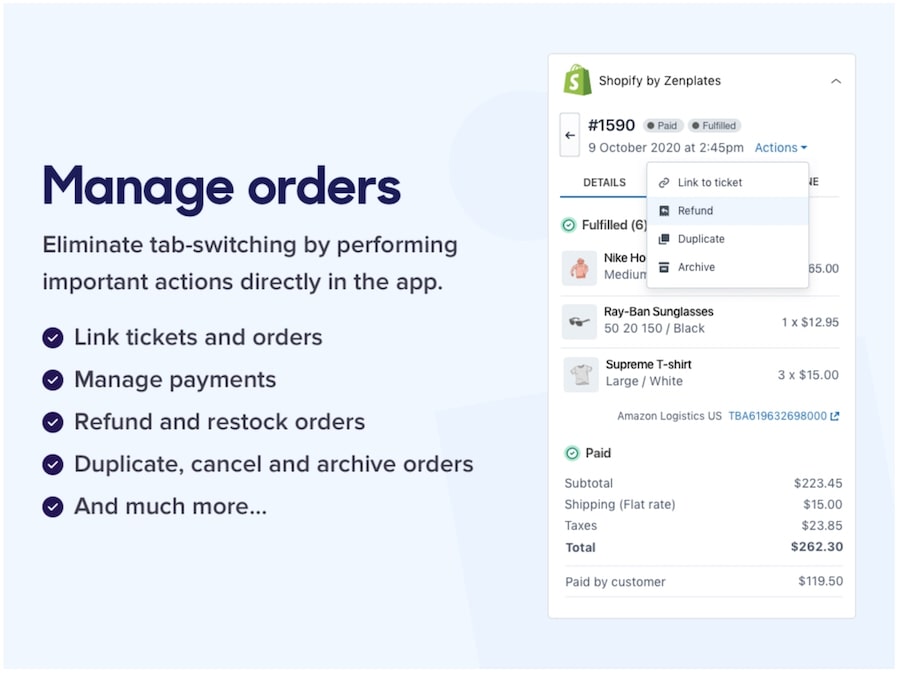
Shopify by Zenplates order management functionalities in Zendesk Sell (Source: Zendesk Marketplace)
Our Expert Opinion
Zendesk Sell has a dedicated app for Shopify and excellent features for lead and direct sales management. Its Shopify by Zenplates app helps streamline your sales reps’ work by consolidating customer and order data from your CRM and Shopify onto a single screen. In addition, Zendesk Sell provides various omnichannel communication tools such as email, an in-app phone dialer, and SMS for convenient customer outreach.
Bitrix24: Best for Product List Management

Pros
- It offers native Shopify integration for managing product lists, customer database, and orders in Bitrix24.
- Its robust ecommerce module has special features like coupons, shipping cost calculator, payment processing, and inventory management.
- It has a Contact Center for communicating with customers via email, live chat, phone, SMS, and social media messaging.
Cons
- Its complex navigation and interface are not suited for first-time users.
- Phone and email communications are locked in with Basic plan ($49 per month for five users).
- Shopify integration requires paid plan subscription (starting at $49 per month for five users).
- You want to manage Shopify product lists from your CRM: Bitrix24 offers several native Shopify integrations that enable you to sync and manage Shopify product lists. This connection triggers the automatic transfer of customer data and order details, eliminating the need for manual imports. Some of the apps from Bitrix24 Market also let you sync product data from multiple online stores.
- You need to apply coupons and shipping costs to orders: Bitrix24 has a robust ecommerce module that allows you to apply coupons and cumulative discounts to orders. You can also apply a fixed shipping cost to an order or generate automatic shipping calculations based on parameters like the customer’s address or package weight.
- You’re looking for a simple sales CRM that integrates with Shopify: While Bitrix24 offers a modern and intuitive interface, it has a steep learning curve for beginner-level users. This is largely due to its robust feature offerings, which include CRM, collaboration, communication, ecommerce, and marketing modules on a single platform.
- Alternative: Pipedrive and Capsule CRM are among the top contenders in this list for simplicity and ease of use. They both have simple and intuitive interfaces that make them easy to learn, use, and navigate for users of all skill levels.
- You want free access to phone and email communication tools: Bitrix24’s Contact Center is included in all plans, but the free plan only lets you communicate with customers via live chat, social media messaging, and web forms. You’ll have to subscribe to a paid plan (starting at $49 per user monthly) to use phone and email channels.
- Alternative: HubSpot CRM’s free plan allows you to send and track emails, as well as integrate it with voice-over-internet-protocol (VoIP) systems to make and receive calls. Its paid plans (starting at $15 per user monthly) include built-in inbound and outbound call capabilities.
Bitrix24 Pricing Plan & Overview*
*Pricing is based on annual billing per month for plans for small teams and businesses. Enterprise-level plans and a monthly billing option are available at a higher cost. We update pricing information regularly but encourage our readers to check current pricing.
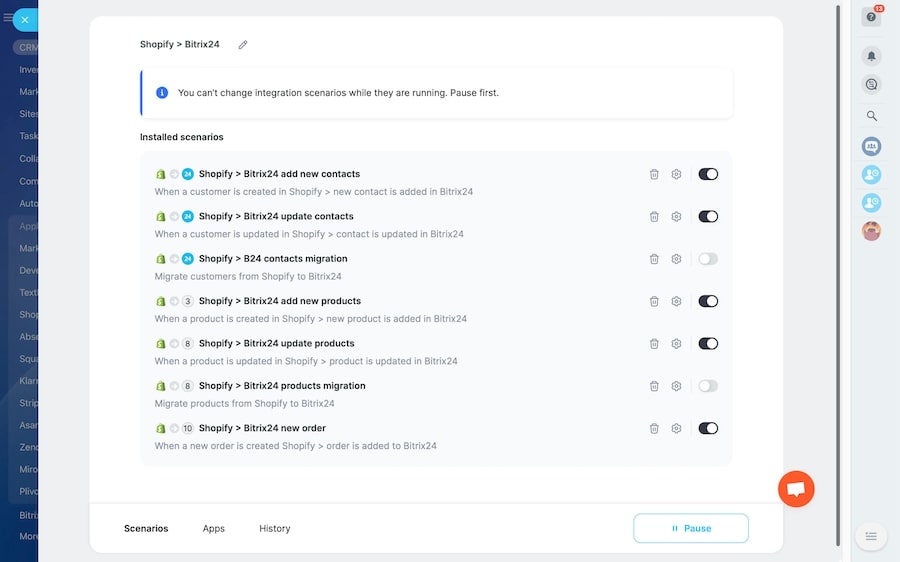
Bitrix24-Shopify integration settings (Source: Bitrix24 Market)
Our Expert Opinion
Bitrix24 has dedicated native apps for Shopify integration, one of which is the Albato Shopify app. This app automatically syncs your CRM database in real time each time a new product is added to your Shopify list. Bitrix24 also sets itself apart from other providers because of its special ecommerce features, which include coupons, shipping cost calculator, payment processing, and inventory management.
Pipedrive: Best for Shopify Sales and Inventory Tracking

Pros
- Shopify by Make integration app enables users to manage Shopify sales and inventory from Pipedrive.
- It includes a built-in product catalog to track items you sell, their cost, price, description, ID numbers, and additional notes.
- Its solid contact data management tools have activity tracking, duplicate detection, and visual timelines.
Cons
- It lacks a free plan and only offers a 14-day free trial.
- It doesn’t have tools for processing payments and applying coupons to Shopify orders.
- Workflow automation is relatively expensive at $29 per user monthly (Advanced plan).
- You need a CRM to manage your Shopify sales and inventory: Pipedrive has a dedicated app for Shopify integration called Shopify by Make. This app automatically syncs data between Shopify and Pipedrive, allowing you to manage Shopify sales and inventory from your CRM. You can view inventory levels in real-time and make informed decisions on your product stocking.
- You want a Shopify CRM with a built-in product catalog: All of Pipedrive’s plans allow you to build a catalog of your products and services with fields for details like category, unit price, and visibility. You can link these products to deals in your pipeline and use Pipedrive’s Smart Docs feature to attach product information to quotes.
- You want a free CRM to manage your Shopify orders: With a starting price of $14 per user monthly, Pipedrive is not necessarily an expensive CRM. However, it does not offer a free-forever plan, only a 14-day free trial.
- Alternative: HubSpot CRM is our top pick for a free Shopify CRM. Its free plan allows you to sync Shopify data with your CRM database in real-time so you can track orders and view abandoned carts from the ecommerce deal pipeline.
- You’re looking for tools for processing payments and applying coupons: Pipedrive does not have advanced ecommerce tools like coupons and payment processing. Its built-in ecommerce features are limited to product catalogs.
- Alternative: Bitrix24 has a free plan with a robust ecommerce module and unlimited user allocation. It offers special tools for processing payments, applying coupons, and calculating shipping costs for Shopify orders.
Pipedrive Pricing Plan & Overview*
Pipedrive Pricing Add-ons:
- Projects Project management tool set; included in Power and Enterprise plans : Starts at $6.70 per user monthly
- Campaigns Customizable email marketing campaigns : Starts at $13.33 per company monthly
- LeadBooster Lead generation tool set : Starts at $32.50 per company monthly
- Smart Docs Trackable documents; included in Professional plan and above : Starts at $32.50 per company monthly
- Web Visitors Web visitor tracking and lead ranking : Starts at $41 per company monthly
*Pricing is based on annual billing per month. Monthly billing is available at a higher cost. Pipedrive comes with a 14-day free trial for paid plans. We update pricing information regularly but encourage our readers to check current pricing.
Our Expert Opinion
Pipedrive’s dedicated app for Shopify integration (Shopify by Make) is designed to streamline your Shopify sales management and inventory tracking processes. Its two-way data sync ensures that your sales team can access the most up-to-date customer purchase history and product inventory at all times. As a bonus, it has a simple and highly intuitive interface with drag-and-drop functionality that makes it very easy for new users to learn and navigate.
Freshmarketer: Best for Multichannel Customer Engagement

Pros
- Native integration with Shopify is ideal for customer engagement on multiple channels, including email, text message, social media, and live chat.
- You can run personalized Shopify campaigns like welcome emails, abandoned carts, and product recommendations.
- Its robust performance reporting tools have revenue attribution and email.
Cons
- Advanced reports and marketing dashboard are not available for free; they cost $15 per user monthly with Enterprise plan.
- It lacks inventory and order management features.
- It lacks built-in tools for invoicing and payment processing.
- You want to engage with Shopify customers via multiple channels: Freshmarketer has a native Shopify integration app that enables you to communicate with your Shopify customers on multiple channels from a single platform. These include email, live chat, SMS, WhatsApp, and social media messaging channels like Facebook and Instagram.
- You need a robust marketing automation solution to grow your Shopify store: Using Freshmarketer, you can run different types of ecommerce campaigns for your Shopify store. These include welcome emails, abandoned carts, cross-sell emails, newsletters, price drop emails, product recommendations, and social media posts. You can also set up personalized campaigns based on Shopify-specific segments.
- You’re looking for a free CRM with reporting tools and dashboards: Freshmarketer’s free plan is limited to out-of-the-box reports and does not include dashboards. You have to upgrade to its Enterprise plan ($15 per user monthly) to access custom reports, marketing dashboards, and analytics tools.
- Alternative: HubSpot CRM’s free plan includes sales performance reports, revenue reporting with a dashboard, and email health reporting.
- You need a CRM with inventory and order management features: Freshmarketer is primarily a marketing automation suite, although it has contact management features. It does not have tools for tracking inventory and managing sales orders.
- Alternatives: Pipedrive’s native integration with Shopify, which is available across all plans (starting at $14 per user monthly), allows you to manage orders and inventory in your Shopify store. Bitrix24’s free plan and Zoho CRM’s Standard plan ($14 per user monthly) both offer tools for managing inventory, orders, quotes, and invoices.
Freshmarketer Pricing Plan & Overview*
Freshmarketer Pricing Add-ons:
- Marketing contacts: Starts at $1,000 per month for 5,000 additional contacts
- Conversion Rate Optimization Includes heatmaps, session replay, personalization, A/B testing, split URL testing, form analytics, funnel analysis, and polls and feedback : Starts at $219 per month for 10,000 monthly unique visitors (MUV)
- Dedicated IP address: $199 per account monthly
- Freshbots All interactions between an end-user and a chatbot within 24 hours are counted as 1 bot session. : $100 for 1,000 Freshbot sessions
- Messaging Agent Access the Agent Inbox to manage chat conversations across channels—email, chat, SMS, & WhatsApp—in one place. : $79 per user monthly
*Pricing is based on annual billing per month. Monthly billing is available at a higher cost. Freshmarketer comes with a 21-day free trial for paid plans. We update pricing information regularly but encourage our readers to check current pricing.
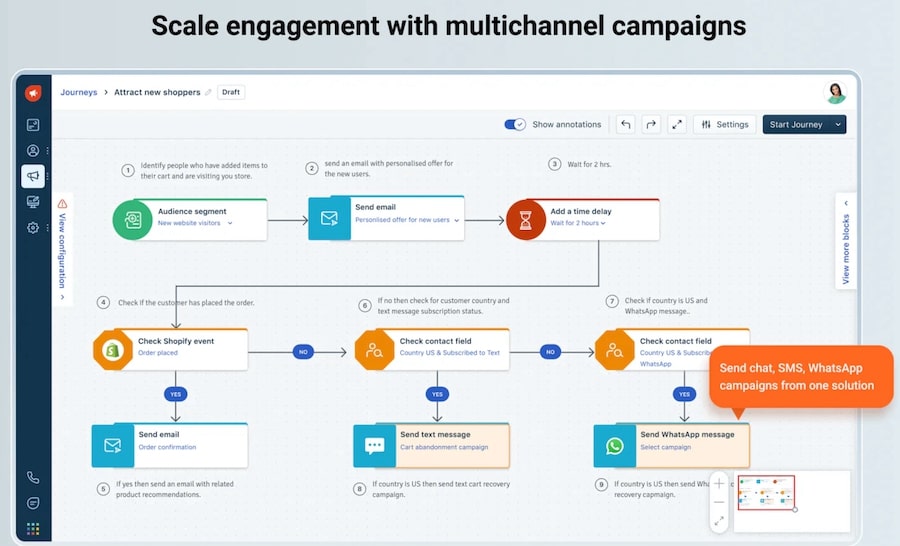
Freshmarketer for the Shopify customer journey with multichannel campaigns (Source: Shopify App Store)
Our Expert Opinion
Freshmarketer is our top pick for small to midsize business owners looking for a CRM that can help them run multichannel Shopify campaigns to increase sales and customer engagement. Its native integration with Shopify enables you to automate personalized campaigns via email, SMS, live chat, and social media. You can also track your Shopify store’s performance from Freshmarketer’s ecommerce dashboard and analyze campaign performance with key metrics.
Capsule CRM: Best CRM for Shopify Customer Segmentation

Pros
- Shopify integration enables users to segment customers based on Shopify events and custom fields in the CRM.
- All plans include an AI Content Assistant for crafting and optimizing sales emails.
- Free plan includes a prompt to record the reason for lost opportunity to inspire future sales strategy.
Cons
- It does not have inventory management and order processing features.
- Marketing campaign tools require an additional fee starting at $10 per month for three users.
- It lacks a native Shopify integration; it requires a third-party app connector like Zapier.
- You need a Shopify CRM with solid customer segmentation features: Capsule CRM allows users to tag contacts as a “Customer” and record products that they have purchased on Shopify. It also creates a new contact record in the CRM whenever there’s a new paid order, new customer, new account, or abandoned cart in Shopify. This ensures that you never miss the chance to engage and follow up with your customers.
- You want access to AI tools for creating sales emails: Across all plans, Capsule CRM provides you with an AI Content Assistant that helps you craft and optimize email copy. This tool is also very easy to use regardless of your technical experience. Simply type in what you want to write about, and it will automatically generate content with just one click.
- You want to manage Shopify orders directly from your CRM: Capsule CRM does not offer built-in tools for tracking inventory and managing orders. Its Shopify CRM integration capabilities are also limited to contact creation and segmentation.
- Alternative: Pipedrive and Zoho CRM both offer a plan costing $14 per user monthly that allows you to manage your Shopify orders and inventory without leaving the CRM. Bitrix24 also has a free plan for unlimited users that has an ecommerce module with order, quote, inventory, and invoicing management tools.
- You need a CRM with built-in marketing campaign tools: While Capsule CRM offers email templates and the ability to send emails, it does not have built-in tools for launching marketing campaigns. You’ll have to subscribe to its Transpond marketing automation package (starting at $10 per month for three users).
- Alternative: Freshmarketer is an excellent option for those who want to run Shopify campaigns from their CRM. It offers a free plan that allows you to automate campaigns for welcome emails, abandoned carts, newsletters, and even social media posts.
Capsule CRM Pricing Plan & Overview*
Capsule CRM Marketing Add-on: Starts at $10 per month for three users
- Automated email campaigns
- Contact importation and deduplication
- Campaign data, performance, and engagement rating
*Pricing is based on annual billing per month. Monthly billing is available at a higher cost. Capsule CRM comes with a 14-day free trial for paid plans. We update pricing information regularly but encourage our readers to check current pricing.
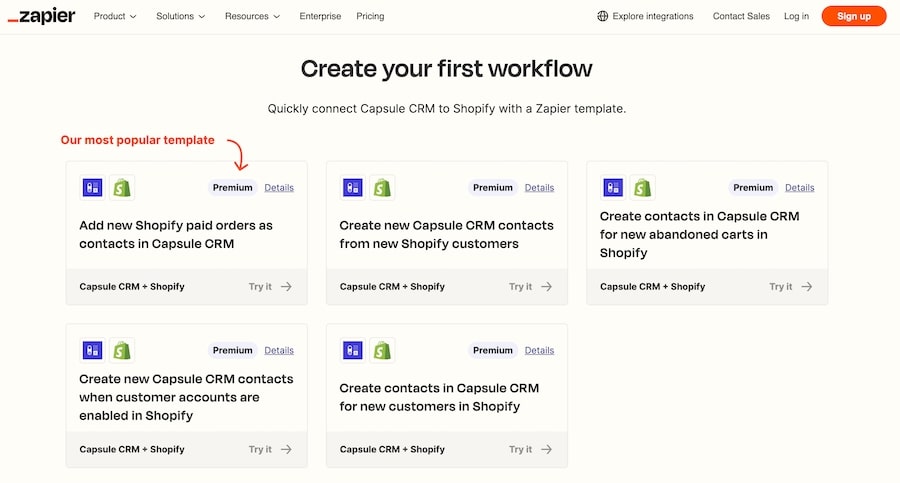
Zapier workflow templates for the Capsule CRM and Shopify integration (Source: Zapier)
Our Expert Opinion
Capsule CRM offers solid tools for segmenting customers using its contact tagging function. It automatically creates a new content record whenever there’s a new paid order, new customer, new account activation, or abandoned cart in Shopify. It is also equipped with an AI Content Assistant that helps you create and optimize sales emails. Plus, Capsule CRM has a simple and highly intuitive interface that makes it very easy to use.
How We Evaluated the Best Shopify CRM
To help you choose the best CRM for your Shopify store, we evaluated the specific features that come with the CRM once it’s connected to the ecommerce platform. Contact database sync, for example, is a vital Shopify-CRM feature. We also looked at other critical product attributes, including the cost of the integration and whether the software offered direct connectivity or if you needed to use a third-party tool like Zapier.
The tabs below offer insight into our evaluation process of the best Shopify CRM integration options:
15% of Overall Score
Cost is typically among the most important criteria for any small business. We considered the availability of free plans, various subscription options, and monthly payment plans.
25% of Overall Score
20% of Overall Score
The availability of Shopify-specific features was the most heavily weighted criterion when evaluating the best CRM solutions for Shopify. We assessed each platform to see if they offered features like email marketing, customer and interaction tracking, task management, and social media integrations. We also checked if these features were offered for free or at a cost.
15% of Overall Score
User-friendliness and intuitiveness were two key considerations when looking into a software’s ease of use. This was analyzed in terms of the availability of built-in templates or automations, the onboarding process or learning curve, the expertise needed to set up the system, and the overall scalability.
15% of Overall Score
Extensive customer service helps prevent poor user experiences while using CRM software. We looked at support availability and whether the provider was available 24/7. We also considered the number of channels users could access, such as phone, email, and live chat. Finally, we evaluated self-service resources such as a knowledge base, community forum, and product tutorials.
10% of Overall Score
In addition to firsthand experience with these Shopify CRMs, we wanted to see what actual users say about each product using their online reviews. This allowed us to see how much they liked the Facebook integration features and whether, in their minds, it was worth the cost.
Frequently Asked Questions (FAQs)
Shopify is a CMS built specifically for ecommerce. This app allows users to easily build and design an online store or marketplace using its customizable themes. It also lets you receive payments from customers.
An ecommerce CRM is a platform that is specifically designed to enable ecommerce businesses to organize, store, manage, and analyze their customer data and interactions. These include customers’ interests, purchasing history, shipping preferences, email subscription opt-ins, and click-through rates. Business owners can use this information to personalize and improve customer experience.
No, Shopify does not have a built-in CRM. However, it integrates with various ecommerce CRM solutions, such as Zendesk Sell, HubSpot CRM, and Salesforce.
Bottom Line
Ecommerce businesses should look for a CRM for Shopify that creates a seamless shopping experience. A Shopify integration of this kind should help you make data-backed decisions on your marketing campaigns.
HubSpot CRM is our top pick because it offers a free plan with robust Shopify integration features. You can manage Shopify orders, view abandoned carts, process payments, and build ecommerce reports to track customer engagement.
